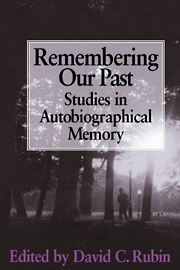Book contents
- Frontmatter
- Contents
- List of contributors
- 1 Introduction
- Part I Approaches
- Part II Accuracy
- Part III Emotions
- Part IV Social functions
- 11 Remembering as communication: A family recounts its past
- 12 Group narrative as a cultural context of autobiography
- 13 Memories of college: The importance of specific educational episodes
- Part V Development and disruption
- Subject index
- Author index
13 - Memories of college: The importance of specific educational episodes
Published online by Cambridge University Press: 14 October 2009
- Frontmatter
- Contents
- List of contributors
- 1 Introduction
- Part I Approaches
- Part II Accuracy
- Part III Emotions
- Part IV Social functions
- 11 Remembering as communication: A family recounts its past
- 12 Group narrative as a cultural context of autobiography
- 13 Memories of college: The importance of specific educational episodes
- Part V Development and disruption
- Subject index
- Author index
Summary
This chapter addresses the issue of how specific educational events are remembered, and how they influence the lives of college students and alumni. Mainstream psychological and educational researchers have rarely looked at the impact of specific college events on students. Rather, research has focused on learning and retention of course content, as assessed by exams, written assignments, standardized tests, and graduation rates. Acquiring general knowledge is seen as paramount, not remembering the specifics of how or when the knowledge was acquired. Endel Tulving (1983, p. 51), perhaps the world's leading authority on episodic memory, stated that “children and people of all ages go to school in order to learn skills and knowledges that they need for life. They do not go to school in order to acquire a storehouse of temporally dated personal memories.”
Educational psychologists are not alone in their neglect of the specific. The primary focus in educational research on general rather than episodic learning is consistent with dominant research strategies in cognitive psychology. Tulving (1983) commented that episodic memory “has received little direct attention from psychologists or other scientists” (p. 1), and that “experiments done in the past can be interpreted as episodic- rather than semantic-memory experiments … but they were not designed as part of a grand plan to understand how people remember personal experiences” (p. 129). This situation is changing. Once one accepts the idea that people's subjective experience of memory, and the belief systems associated with memory, are topics worthy of study in their own right, then research can address areas of personal experience for which controlled experimentation is not possible.
- Type
- Chapter
- Information
- Remembering our PastStudies in Autobiographical Memory, pp. 318 - 338Publisher: Cambridge University PressPrint publication year: 1996
- 17
- Cited by



